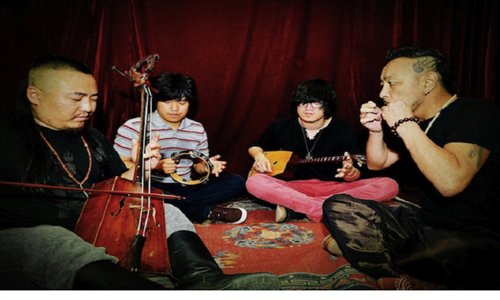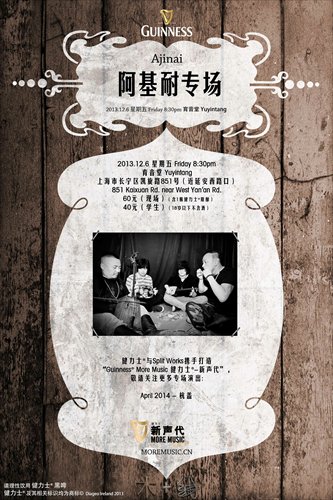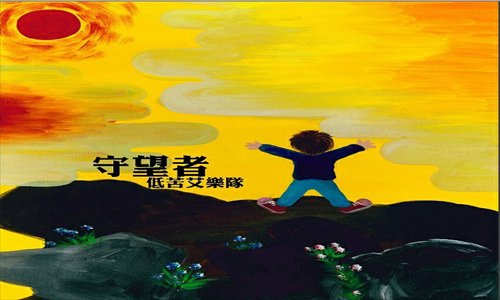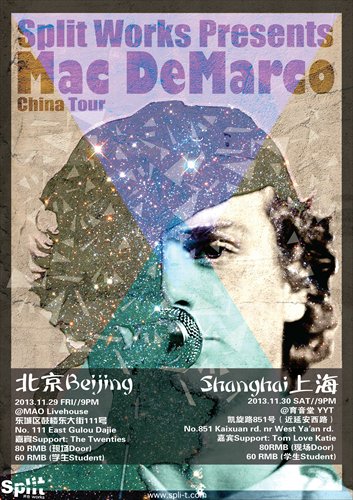HOME >> METRO SHANGHAI
Upcoming gigs
By Lu Tanrou Source:Global Times Published: 2013-11-18 16:33:01

Mongolian folk band Ajinai Photos: Courtesy of the event organizers
Ajinai

Based in Beijing, Ajinai mixes bold and uninhibited Mongolian folk sounds with diverse expressive techniques including throat singing. As a part of the Guinness More Music series, a showcase of China's independent folk scene, Ajinai will perform on December 6 at Yuyintang (851 Kaixuan Road, 5237-8662; 60 yuan/$9.84). We spoke to Ajinai's front man, Hugjiltu.
Q: Ajinai's music is rooted in Mongolian culture. Can you talk about your background?
A: I lived with my grandmother when I was a child. I saw many outstanding characteristics in her. I learned a lot of knowledge from her such as traditional Mongolian customs and traditions. We moved to the city when I was about 10 but my father sent me to my uncle's home on the pasture every vacation to help them with pasturing work. We rode horses, herded sheep and cattle, went hunting. These beautiful memories always linger in my mind. They're great spiritual motivators for what I'm doing now. Another reason is my father. He is a Mongolian storyteller. He knows a lot of Mongolian history and folk songs. I began to learn Mongolian music from him when I was 14.
Q: Many people think that Ajinai and Hanggai are very similar. Can you tell us the differences between these two bands?
A: I used to play with Hanggai for a while. Since 2009 I've been playing with Ajinai. I think Ajinai and Hanggai are very different. Lots of tempos and rhythms in Ajinai's music are different because we use a composite beat tempo. We also adapted songs from other ethnic groups and other countries, playing them with traditional Mongolian instruments like the horse-head fiddle. For example we mixed a Mongolian song with a Bolivian song during our European tour, which was well-received. I use many effects on the morin khuur (horse-head fiddle) and the taobushuer (two-stringed instrument) to create new tones. We also use diverse playing techniques and scales. We are good friends with Hanggai. We sometimes meet in bars and chat. Their shows are great.
Q: How has modernization affected life for Mongolian people?
A: Urbanization is inevitable. We are losing some traditions but also enjoy the convenience of technology. There is no point in opposing modern civilization. But it's important for us to promote and continue our ethnic culture using technology.
Q: Can you share stories of some traditional Mongolian instruments with us?
A: The taobushuer is mostly used by western Mongolians to accompany Sawuerdeng folk dancing. The mouth harp has mysterious tones which were used by Shaman to practice magic. The morin khuur has thousands of years of history. It's nomads' favorite instrument, played solo and as accompaniment, it's very important for Mongolian music.
Low Wormwood

After the success of their acclaimed 2011 album Lanzhou, Lanzhou, the Gansu folk band Low Wormwood are back with a new release, The Watcher. They kick off a nationwide tour this month and will perform in Shanghai on November 29 at On Stage (570 Huaihai Road West, 6216-6991). Featuring a distinctive northwestern Chinese sound, Low Wormwood's music is concerned with social issues and the lives of ordinary people.
The cover of the new album was drawn by a 12-year-old boy, Qiangqiang, whose father Xia Junfeng was sentenced to death for stabbing two chengguan (urban management officers) during a dispute in May 2009. The picture is titled Come Out, the Sun. "I think this cover expresses ordinary people's eagerness for a peaceful and harmonious life," said vocalist and guitarist Liu Kun, in a phone interview on November 7. "Music must assume the responsibility for reality and our society."
Liu said that although Low Wormwood are concerned about this world, they still remain optimistic. "Living itself is our hope. As long as we are alive, we have hopes. Our music is to share this hope with people, telling them not to give up, to always be positive."
"The Monkey King is my favorite artist. I think he can be counted as an artist for his rebellious spirit and unique, unruly character," Liu laughed. "We didn't travel specifically to make this album, but some of our traveling experiences did inspire us."
Having visited Shanghai several times, Liu is fond of the city. He described Shanghai as charming and diverse. "Shanghai still has its old-style tradition but also a modern metropolitan sensibility. The combination of old and new is where its charm lies."
Mac DeMarco

Offbeat Canadian lo-fi wunderkind Mac DeMarco will play Yuyintang on November 30 (80 yuan, 60 yuan for students). Based in Montreal, DeMarco is known for his unruly live performances.
Last year, the 23-year-old released his debut EP, the eclectic Rock and Roll Night Club, followed by his first full-length studio album 2. The more mature-sounding sophomore effort marked a turn away from the sleazy tone and glam rock aesthetics of Rock and Roll and was longlisted for Canada's Polaris Music Prize.
Citing influences that range from Shuggie Otis and Steely Dan to Jonathan Richman and Weezer, DeMarco has impressed critics with his thoughtful songwriting, dark lyrics and jangle pop sound.
Posted in: Metro Shanghai